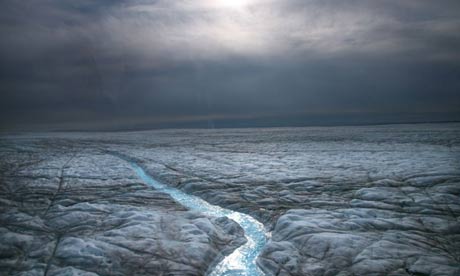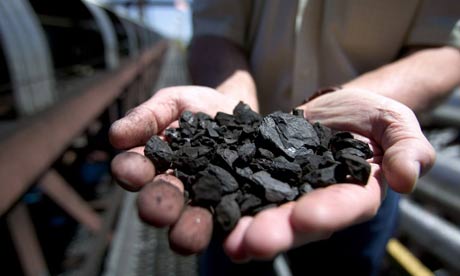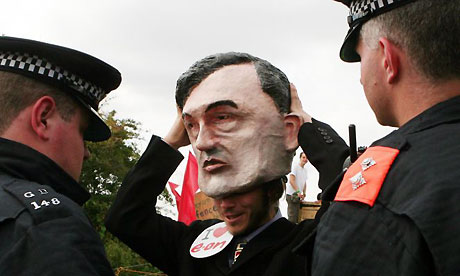Bob Watson rightly warns us to prepare for 4C global warming. To avoid that, we must make drastic CO2 cuts now
Mark Lynas

Melting ice caps in Greenland. Photograph: Uriel Sinai/Getty Images
Unfortunately, Professor Bob Watson is not speaking out of turn in telling the world to prepare for four degrees of global warming. "Mitigate for two degrees; adapt for four" has long been the catchphrase among climate negotiators and campaigners. Translated, that means: try to reduce emissions to stay below two degrees of warming, but also prepare for the worst.
And Bob Watson should know – he is the former chair of the Intergovernmental Panel on Climate Change (IPCC), but was kicked out at the behest of the Bush administration for being too vocal about the threat presented by global warming. (Any sceptic reading who thinks that the IPCC is a conspiracy of environmentalists take note: it is a creature of government as well as of science.) He has long made clear his own personal passion and commitment to tackling the issue – often without mincing his words. He is also someone with a very wide-ranging perspective: after leaving the IPCC, Watson chaired the Millennium Ecosystem Assessment, a landmark UN study published in 2005 looking at the totality of human impact on the planet's natural systems. (The news wasn't good.)
The problem with the "mitigate for two degrees; adapt for four" strategy is that it is doomed to fail. Yes, we should certainly prepare for the worst as far as possible – with flood defences, drought-resistant crops and strategies to ameliorate the loss of wildlife, at the very least – but a look at the likely impact of a four-degrees temperature rise suggests that such a dramatic change would probably stretch society's capacity for adaptation to the limit, not to mention having a disastrous effect on the natural ecosystems that support humanity as a whole.
By the time global temperatures reach four degrees, much of humanity will be short of water for drinking and irrigation: glaciers in the Andes and Himalayas, which feed river systems on which tens of millions depend, will have melted, and their rivers will be seasonally running dry. Whole weather systems like the Asian monsoon (which supports 2 billion people) may alter irrevocably. Deserts will have spread into Mediterranean Europe, across most of southern Africa and the western half of the United States. Higher northern latitudes will be plagued with regular flooding. Heatwaves of unimaginable ferocity will sear continental landscapes: the UK would face the kind of summer temperatures found in northern Morocco today. The planet would be in the throes of a mass extinction of natural life approaching in magnitude that at the end of the Cretaceous period, 65m years ago, when more than half of global biodiversity was wiped out.
Four degrees of warming would also cross many of the "tipping points" which so concern climate scientists: the Amazon rainforest would likely collapse and burn, as part of a massive further release of carbon from terrestrial ecosystems – the reverse of the current situation, where trees and soils absorb and store a good portion of our annual emissions. Most of the Arctic permafrost will lie in the melt zone, and will be steadily releasing methane, accelerating warming still further. The northern polar ice cap will be a distant memory, and Greenland will be melting so rapidly that sea level rise by the end of the century will be measured in metres rather than centimetres.
Hence the current effort – led by scientists, in the main – to drop the two degrees target and talk instead about getting carbon dioxide concentrations in the atmosphere back down to less dangerous levels. This year's CO2 concentration is 385 parts per million (ppm) – now a campaign is forming to get them back down to 350ppm, about the level they were at in the mid 1980s. This isn't just about reducing emissions, it is about getting emissions quickly down to zero (by 2050 or earlier), and then removing some of the excess carbon that humanity has already dumped into the atmosphere. The planet will still get warmer, but on nothing like the scale currently predicted.
The harsh truth is that the latest science shows that even two degrees is not good enough, never mind four. And since four degrees would be a catastrophe that many of us, or our children, would not survive, it is surely our absolute duty to do everything in our power to avoid it.


